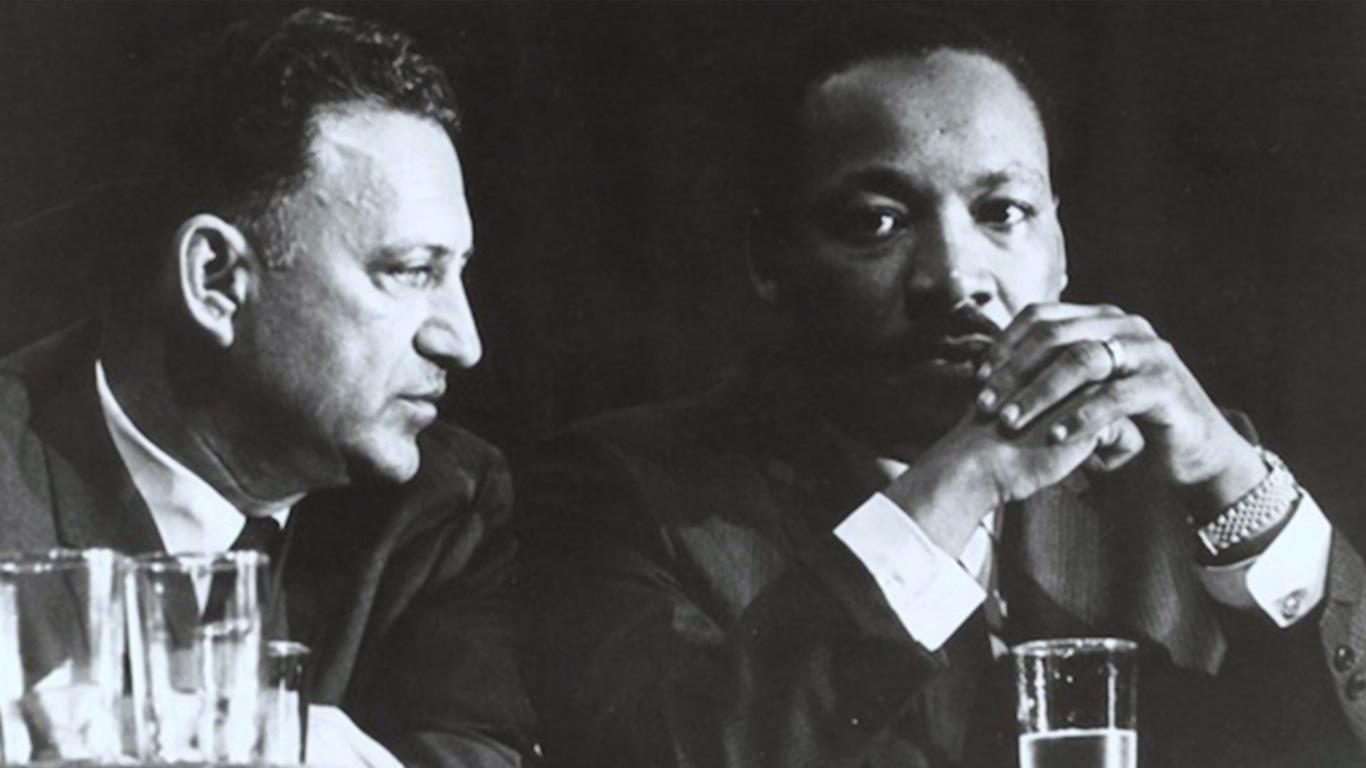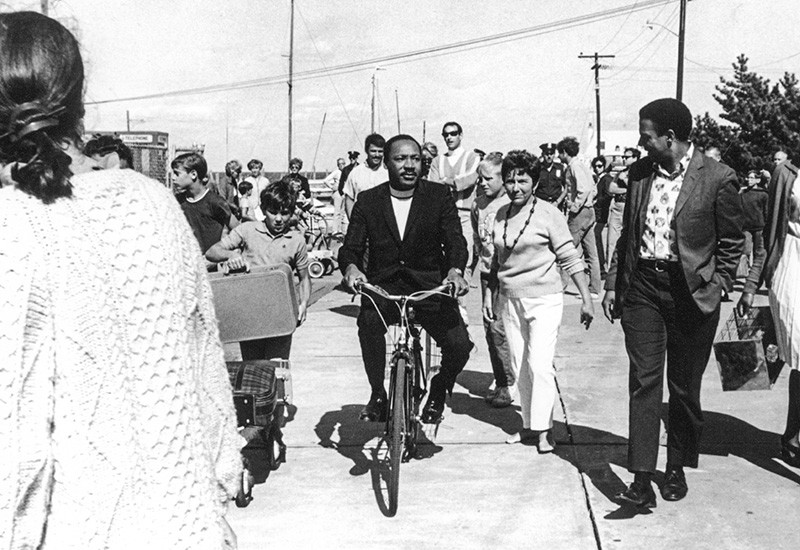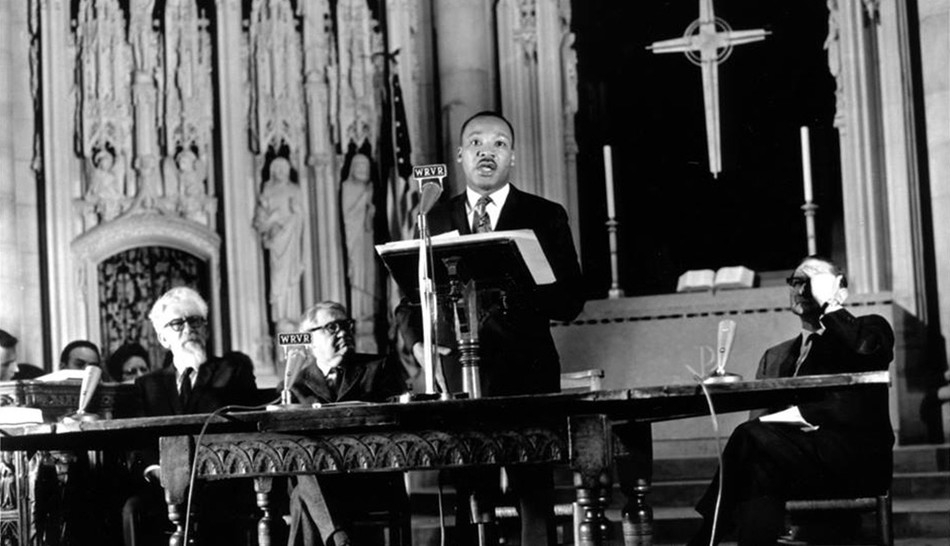
Special Agents of the FBI also observed the following activities at the hotel on April 4, 1967: Martin Luther King, Harry Wachtel and an unknown Negro male walked into the lobby at 10:55 a.m. and took the elevator that serviced the 15th floor at 11:05 a.m., Andrew Young entered the hotel and took the same elevator; and at 11:12 a.m., Stanley Levison came into the hotel and took the same elevator.
— from the Martin Luther King Jr. FBI files
The meeting on the fifteenth floor of the Americana Hotel in New York City was critical. Martin Luther King Jr., president of the Southern Christian Leadership Conference, had been invited to speak that night at Riverside Church, and he and his circle were gaming out the fiscal and political consequences of his planned address. A harsh rebuke of US policy titled “Beyond Vietnam: A Time to Break Silence,” the sermon would no doubt alienate the philanthropic foundations on which King’s organization depended. Most Americans supported the war, and some of King’s advisers felt that the politically explosive speech was ill advised: not only would it chase away donors, it would also enrage President Johnson, who had invested enormous political capital in Vietnam under the flag of anticommunism.
But two figures in the room had a different view. Harry Wachtel ’40LAW and Clarence B. Jones ’53CC were attorneys and confidants of King and acted as his strategists, editors, fundraisers, and legal counsel. To them, the speech was right on the money. “They had stayed up the whole night before, debating,” says Bill Wachtel ’79LAW, Harry’s son. “Many felt Martin shouldn’t break ranks with LBJ, while others, including my father, argued that a moral leader cannot stand silent in the face of an immoral war.”
King’s position was clear. To him, the connection between his ministry and peacemaking was implicit, his antiwar stance a logical corollary to his philosophy of nonviolence. He knew his speech would antagonize Johnson, who, at King’s urging, had signed the Civil Rights Act of 1964 and the Voting Rights Act of 1965. And he knew it would give further ammo to the man bent on destroying him: FBI director J. Edgar Hoover. Ever since King led the Montgomery bus boycott in 1955–56, Hoover had hounded him, monitored him, and defamed him as a Communist dupe, subversive and dangerous.
As the day wore on, some three thousand people gathered in Riverside Church in anticipation of America’s foremost civil-rights activist. Many in attendance were students from Columbia and the Union Theological Seminary (UTS), anxious to hear King’s views on a subject that was of exceeding importance to young people, but which had yet to capture the moral imagination of the nation at large.
King stood in the chancel behind a long wooden table, on which a microphone and a stand holding his speech were affixed. To his right, seated, were Rabbi Abraham Joshua Heschel and historian Henry Steele Commager; to his left was UTS president John Bennett.
“I come to this magnificent house of worship tonight,” King began, “because my conscience leaves me no other choice.”
Harry Wachtel knew exactly what King meant about the sway of the conscience. Growing up in Brooklyn, the son of a Jewish fruit peddler, Wachtel was sensitive to the injustices and hardships faced by working people and minorities. A 1930s college radical, he fought in World War II and then earned a law degree from Columbia. He dreamed of becoming counsel for the United Steelworkers, only to find that the union wasn’t looking for an in-house lawyer. And so Harry drifted to Wall Street, becoming something very different from what he had envisioned: a powerful, cigar-smoking corporate attorney.
In the late 1950s, Harry was named vice chairman of the Rapid-American Corporation, a conglomerate whose holdings included a chain of five-and-dime stores called McCrory’s. He and his wife, Leonora, known as Lucy, lived with their children in affluent Great Neck, Long Island.
At the same time, a world away in Montgomery, Alabama, a young pastor, Martin Luther King Jr., was making his name as a civil-rights leader. In 1960, King returned to his hometown of Atlanta to lead the Ebenezer Baptist Church. That was the year that Black college students began holding nonviolent sit-ins at segregated dime-store lunch counters throughout the South. Among those stores was McCrory’s.
One day, Wachtel received a letter, on behalf of King, from Clarence B. Jones. A Black attorney from Philadelphia who had played football at Columbia and clarinet at Juilliard, Jones had met King in February 1960, when he agreed to join King’s defense team in a tax-evasion case in Alabama (which ended in King’s acquittal). Now Jones sent letters to executives of the five-and-dimes, calling for them to desegregate the stores. Wachtel responded immediately. He and Jones exchanged more letters, and in early 1962, Wachtel met with King.
“Martin came to New York for a brief meeting, and instead my dad met with him all day,” says Bill.
Wachtel believed in King and his message and agreed to desegregate McCrory’s and help in any other way he could. Offering his services pro bono, he set up the Drum Major Foundation, a 501(c)(3) that allowed the oft-arrested pastor to receive tax-free donations to cover his onerous legal fees. Soon Wachtel, like Jones, became King’s friend and consultant. With his contacts in finance, government, and the movement, Wachtel found himself uniquely positioned to effect change in ways he could not have imagined in law school.
“My mother said to him, ‘Pick your passion,’” Bill says. “She told him, ‘Either make the world a better place or get another life.’ My father had the chance to devote himself to Martin, and that’s exactly what he and my mother did. They were very much in it together. She was his moral compass.”
On the surface Wachtel is a partner in the law firm of Rubin, Wachtel, Baum and Levine, 598 Madison Avenue, New York, New York, a very large and influential law firm.
— from the Martin Luther King Jr. FBI files
The FBI, under Hoover, began listening to King’s phone calls in 1962, and no sooner did Wachtel join King than he landed on the FBI’s radar. According to transcripts, Wachtel, despite his Madison Avenue imprimatur, was, in the Bureau’s view, one of “the most dedicated and dangerous communists in the country.”
After the earthshaking events of 1963 — the March on Washington and the assassination of President Kennedy — 1964 brought legislative change. President Johnson signed the Civil Rights Act, which outlawed segregation and banned discrimination on the basis of race, religion, sex, or national origin. Also that year, Wachtel and Jones formed an advisory group for King called the New York Research Committee, which met each month at Wachtel’s office to philosophize and plan. They also spoke on the phone almost every night. Bill remembers them poking fun at the FBI, whom they suspected of listening in on their conversations. “They’d be on conference calls and they’d say, ‘Hey, J. Edgar, get off the phone so we can talk!’”
Meanwhile, the relationship between Wachtel and King grew closer. When King won the Nobel Peace Prize in October 1964, Harry and Lucy Wachtel accompanied the Kings to the ceremony in Oslo.
Fortified by his new international status, King returned home and began lobbying Johnson for additional protections for minorities. But the president, fearful of further damage to the Democratic Party, was immovable. “We have lost the South for a generation,” Johnson is famously said to have told an aide after signing the Civil Rights Act. So when King declared that he now wanted a voting-rights law, Johnson fumed, and refused to receive the Nobel laureate at the White House.
But for King, the Civil Rights Act was not enough. As the Supreme Court had stated in 1964 in Reynolds v. Sims, the right to vote was “preservative of other basic civil and political rights.” What King wanted was legal protections for Black voters, whose access to the ballot in the South was under constant attack.
Johnson’s anger meant that Wachtel had to marshal all his powers of diplomacy and persuasion. Known as a forceful personality, Wachtel worked the phones and managed to broker a meeting between King, himself, Johnson aide Bill Moyers ’88HON, Attorney General Nicholas Katzenbach, and Vice President Hubert Humphrey. The men convened in room 180 of the Old Executive Office Building in Washington.
During the meeting, the phone rang. It was the president.
“Johnson says to Humphrey, ‘I need you here in the Oval Office. I’m here with the king of Norway,'” Bill recounts. “Humphrey says, ‘Mr. President, I’m here with Dr. King.’ ‘Bring him along,’ says the president.”
This was exactly what Wachtel had hoped for.
“So they go over to the Oval Office, and Johnson steps out and meets with Martin privately,” says Bill, who heard the story often growing up. “Martin says, ‘Mr. President, you gave me a civil-rights act, but it’s like playing baseball without a bat. I need a voting-rights act.’ They have a ten-minute conversation, and Martin comes out of the White House. Everyone says, ‘What happened?’ Martin says, ‘Well, the brother said I need to understand that he just has so much power.’ And everyone says, ‘What are we going to do?’ And Martin says, ‘We gotta get the brother more power.’”
What Johnson wanted was for King “to do something on TV so the average American could realize that what you’re dealing with has to change,” says Bill.
The event that would meet this criterion was a march from Selma, Alabama, to Montgomery, to draw attention to voter suppression in the South. King apprised Johnson of his plans for the peaceful demonstration, and cameras were rolling on March 7, 1965, when Alabama state troopers attacked the marchers on the Edmund Pettus Bridge. Footage of the event, known as Bloody Sunday, was broadcast across America. Johnson now had his voting-rights casus belli. A week later, he spoke to the nation.
“The president invited Martin to come to the famous address to Congress after Bloody Sunday, when he said ‘we shall overcome,’” says Bill. “Martin couldn’t make it, because he was in Chicago, but he watched it on TV, and it’s said that it was the only time anyone saw Martin weep openly.”
On April 4, 1967, Martin Luther King Jr … spent eight hours in conference with [his] top advisers in New York … Later the same day, King gave a speech in New York attacking United States Vietnam policy.
— from the Martin Luther King Jr. FBI files
Many observers were surprised that King would stand against Johnson over a matter of foreign policy when America’s civil-rights issues were still so pressing. But in January 1967, King saw a photo essay in Ramparts magazine by William Pepper ’59CC called “The Children of Vietnam.” The pictures showed Vietnamese children who had been burned and mutilated by napalm and shrapnel. King could not look away.
In Riverside Church in the spring of 1967, he put everything on the line.
“I speak for those whose land is being laid waste, whose homes are being destroyed, whose culture is being subverted,” he said. “I speak for the poor of America who are paying the double price of smashed hopes at home and death and corruption in Vietnam. I speak as a citizen of the world, for the world as it stands aghast at the path we have taken.”
The New York Times, in an editorial called “Dr. King’s Error,” criticized King for simplistically linking racial injustice and the war, declaring that doing so “will lead not to solutions but to deeper confusion.” The Washington Post opined that King, in attacking US policy, had “done a grave injury to those who are his natural allies,” and that he had “diminished his usefulness to his cause, to his country and to his people.” The NAACP judged the linkage of civil rights and global human rights a “serious tactical mistake.”
“King became a pariah,” Jones said at event held last year at Stanford, in which a recently discovered, high-quality recording of the “Beyond Vietnam” speech was presented. “He came under a cascade of public attack.”
“Martin gave the speech,” Bill says, “and he was killed a year to the day after. I believe that he signed his death warrant with that speech.”
On April 4, 1968, King was shot to death while standing on the balcony outside his room in the Lorraine Motel. Bill was fifteen when he heard the news from a friend. “It was my unfortunate task to tell Dad that Martin had died,” he says. “I’ll never forget the wail that came out of my father that day.”
After King’s death, Harry Wachtel became the personal lawyer to Coretta Scott King and spearheaded the establishment of the King Center in Atlanta, a library and archive of the civil-rights movement. “Something went out in him after Martin’s death,” says Bill. Still, Harry soldiered on, even teaching briefly at Columbia.
“His class was on the art of the boycott,” says Bill. “To my father’s mind, going back to the days of the McCrory stores, the wielding of economic power was the greatest way of affecting nonviolent social change.”
Jones, who assisted King with his “I Have a Dream” speech and smuggled out King’s “Letter from a Birmingham Jail” in 1963, and who was editor and part owner of the Amsterdam News in the early 1970s, is scholar in residence at the Martin Luther King Jr. Institute at Stanford. In 2018 he cofounded the University of San Francisco Institute for Nonviolence and Social Justice to promote the teachings of King and Gandhi.
Harry Wachtel died in 1997, but his work continues. Bill, a founding partner of the law firm Wachtel Missry, is co-chair with Martin Luther King III of the nonprofit Why Tuesday?, which they co-founded in 2005 to raise awareness of the problems in America’s voting system — particularly laws that required voters go to the polls only on a single working day. “Now, on account of the pandemic, people have been able to vote in every state on more than a single working day,” Bill says, “and I don’t think it’s ever going to go back.” He and Martin Luther King III also continue the work of the Drum Major Institute, a social-justice think tank now headed up by Martin’s wife, Andrea Waters King.
Despite the voting controversies of the recent election, Bill is optimistic about the future of voting rights, and believes his father, who played a key role in the passage of the Voting Rights Act, would be, too. “This past election cycle has proven that voting is and hopefully always will be a precious right that all Americans desperately want to exercise,” says Bill. “I think everyone, regardless of political party, must realize that our system of democracy has been put to its test, and that right has won out.”




